Senators Rounds and Schumer submit UAP Disclosure Act as possible amendment to NDAA
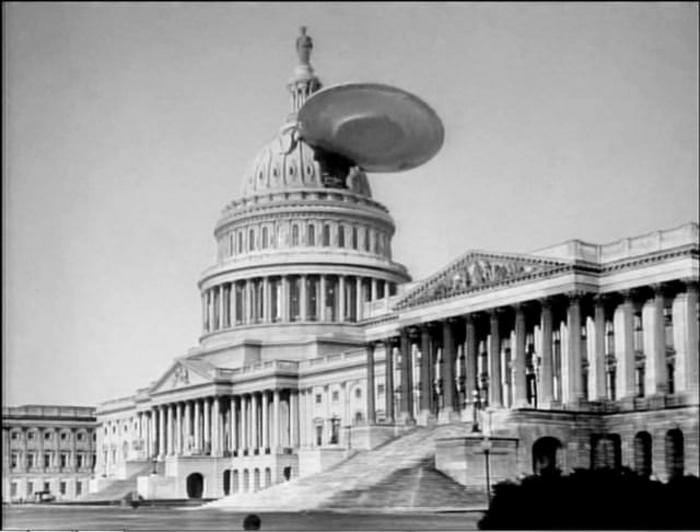
By Douglas Dean Johnson
@ddeanjohnson on X/Twitter // my gmail address is my full name
Initially posted Saturday, July 13, 2024, 2:45 PM EDT. Subsequent revisions are noted in a log that appears at the end of the article. Latest update: August 3, 2024.
Senator Mike Rounds (R-SD) has introduced a version of the Unidentified Anomalous Phenomena Disclosure Act (UAPDA), with Senate Majority Leader Chuck Schumer (D-NY) as lead co-sponsor.
Senator Rounds, who is a member of both the Intelligence and Armed Services committees in the U.S. Senate, on July 11, 2024 submitted the UAPDA text as a possible floor amendment (SA 2610) to the Fiscal Year 2025 National Defense Authorization Act (NDAA, S. 4638). The text of the new Rounds-Schumer UAP Disclosure Act appears on pages S4943-4950 of the July 11, 2024 edition of the Congressional Record, which was posted on line on July 13. The entire text of the Rounds-Schumer amendment is embedded below as a PDF file.
Here is a link to SA 2610 in plain text.
While I have not yet had the opportunity to thoroughly review the Rounds-Schumer language as submitted, it appears to largely track the Schumer-Rounds UAPDA that was incorporated into the FY24 NDAA that passed the Senate on July 27, 2023. The 2023 version of the UAPDA was later gutted in conference negotiations with the House of Representatives, due mostly to opposition from the Pentagon. (A much narrower provision requiring the National Archives and Records Administration to collect certain UAP-related records was enacted.) The new Rounds-Schumer proposal retains controversial provisions providing for creation of a presidentially appointed, Senate-confirmed Unidentified Anomalous Phenomena Records Review Board-- a temporary federal agency with broad powers, including subpoena and eminent domain authorities. It also retains eyebrow-raising definitions for such key operative terms as "non-human intelligence," "technologies of unknown origin," "unidentified anomalous phenomena," and "legacy program."
WHAT HAPPENS NEXT?
Senate Majority Leader Schumer has not yet announced when the full Senate will take up NDAA. So far, over 800 possible floor amendments have been filed. [UPDATE: As of August 3, 2024, 1119 amendments had been filed to S. 4638. On August 1 the Senate began its summer recess, to resume regular sessions on September 9.] Under Senate rules, each senator has the theoretical right to offer any number of freestanding floor amendments to an authorization bill such as NDAA, and perhaps to force roll call votes on each – but in practice, there are many constraints. The managers of the NDAA, of both parties, would not be disposed to subject the bill to a wide-open floor amendment process, which would be politically fraught and could consume many days of floor time. Moreover, any senator has the power to create a 60-vote hurdle for any amendment. Thus, each year agreements are negotiated to limit the number and subject matter of amendments to the NDAA. Most of these negotiations occur out of public view.
I make no predictions as to the prospects for ultimate Senate passage of the Rounds-Schumer amendment this year. It is noteworthy that in 2023, Majority Leader Schumer was the lead sponsor of the measure, but that key role has now been assumed by Senator Rounds, who is a very capable senator but a member of the minority party in the Senate. However, I will predict that if the UAPDA does clear the Senate this year, the UAPDA must first become part of the NDAA through some broader package deal (e.g., as part of a multi-subject "manager's amendment," or within a bill-wide write over called a "substitute amendment"). That would occur through a process of behind-the-scenes negotiations, not by floor debate and a roll call vote on the Senate floor.
What I am describing here is also the way in which many other amendments on diverse subjects will also be resolved. Most likely, only a small number of subject-specific amendments to NDAA will receive separate roll call votes on the Senate floor, and I would be very surprised to see any UAP-related provision receive such a vote. No UFO-related amendment has ever been the subject of a separate, issue-specific roll call vote on the floor of either house of Congress.
Even if the UAPDA (or something derived from it) does clear the Senate as part of NDAA, such language would still face conference committee negotiations with the House of Representatives. The House-passed version of NDAA (H.R. 8070) contains no UAP-related provisions. Nor have I seen any evidence that the Pentagon's negative posture towards the UAPDA has softened since 2023.
UPDATE: Journalist Matt Laslo published a July 31, 2024 interview with Senator Rounds, in which Rounds said regarding the UAPDA, "At least I think we’ve got a shot at it, because I think anything that comes over would be with a manager’s package that we’re putting together now...I mean, there’s a pretty good manager’s package being developed, I think. So if you take what came out of [the Senate Armed Services] committee, along with a consensus manager’s package on stuff, and then pre-conference that with the House.” Rounds also indicated that discussions regarding the UAPDA were continuing with key House members, seeking to establish "maybe more of a comfort level that they would have in terms of what our goal is.” [Readers who are interested in receiving Laslo's reports on interviews such as this in near real-time should subscribe to his worthwhile new service – see https://www.askapol.com/s/uaps]
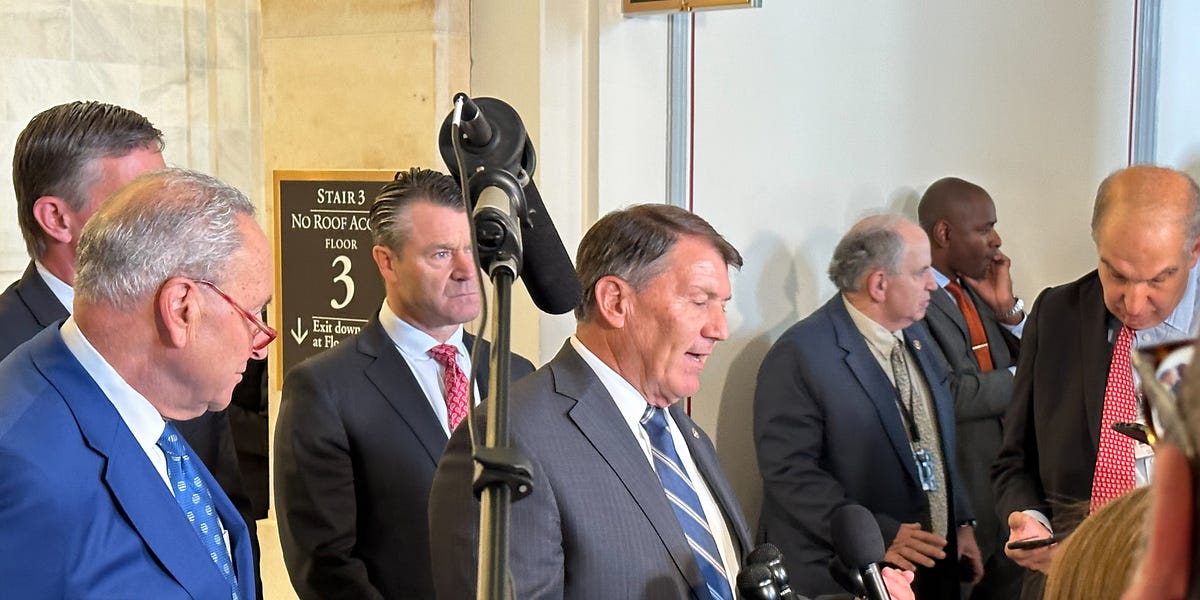
[CO-SPONSORSHIP UPDATES: On July 23, 2024, Senator Kirsten Gillibrand (D-NY) signed on as a co-sponsor of SA 2610, the Rounds-Schumer UAPDA. On August 1, Senator Martin Heinrich (D-NM) joined as a co-sponsor.]
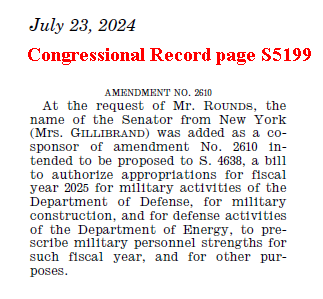
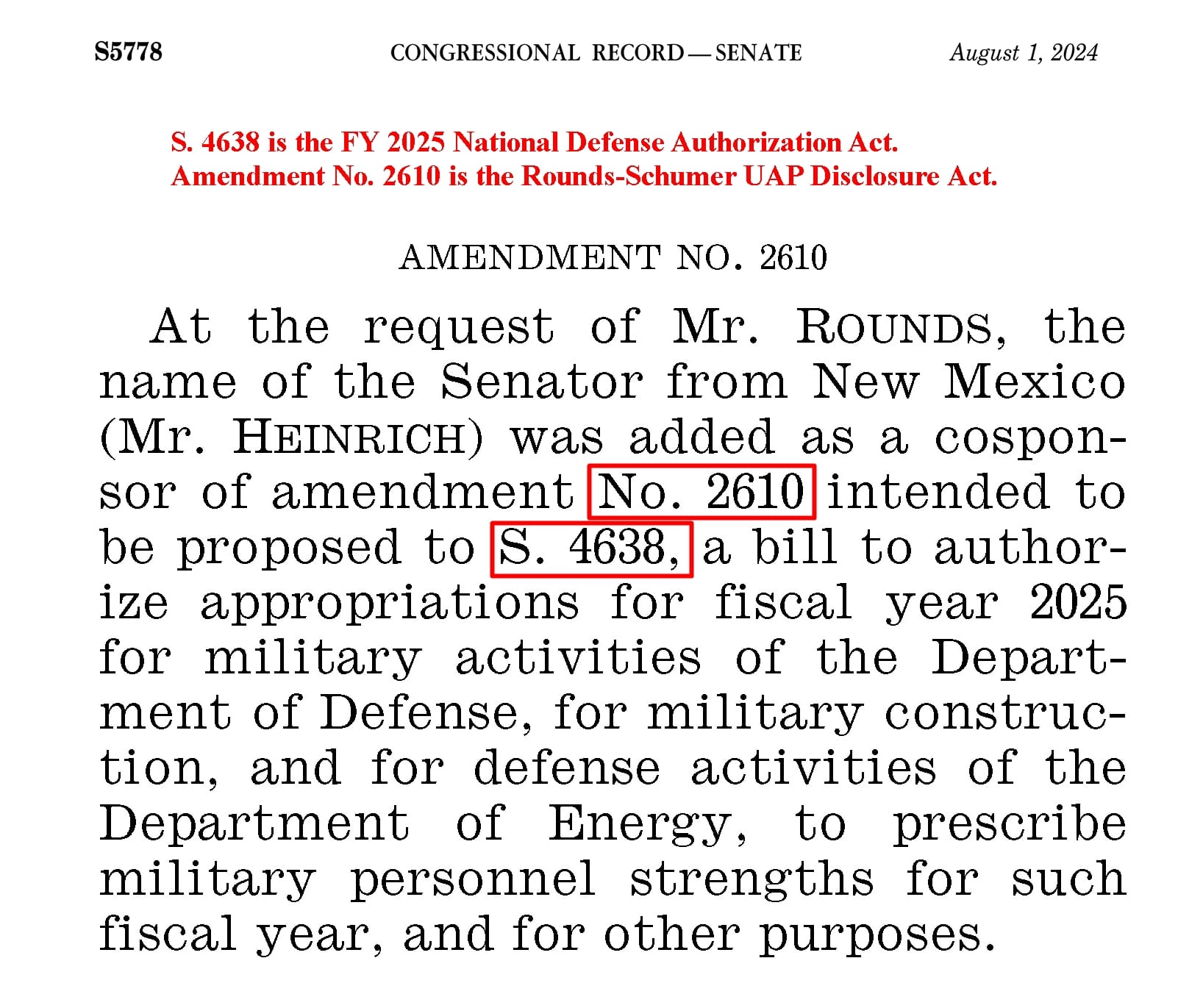
INTELLIGENCE AUTHORIZATION ACT
In many years, but not all, the Intelligence Authorization Act (IAA) is merged with the National Defense Authorization Act (NDAA) at a some stage in the legislative process. When this is done, the final votes in the U.S. House of Representatives and the U.S. Senate are on a merged NDAA-IAA, and the two measures are sent to the President as a single bill.
Apparently seeking to follow this path again this year, Senator Mark Warner (D-VA), chairman of the Senate Select Committee on Intelligence (SSCI), on July 11 filed the text of the FY25 Intelligence Authorization Act (IAA, S. 4443) as a proposed amendment (SA 2274) to NDAA (S. 4638). As approved by the SSCI, the IAA contains several UAP-related provisions, which I described in a long post on X/Twitter on June 24, 2024, found at the link below.
UFO CONGRESSIONAL NEWS: SENATE INTELLIGENCE COMMITTEE ISSUES REPORT ON FY 2025 INTELLIGENCE AUTHORIZATION ACT
— D. Dean Johnson (@ddeanjohnson) June 24, 2024
On June 3, 2024, I reported on the UAP-related provisions of the Fiscal Year 2025 Intelligence Authorization Act (IAA) (S. 4443) that had been approved by the U.S.… pic.twitter.com/70e73XgbT1
The graphic below shows the entire text of the UAP-related provisions of the IAA S. 4443) as it was originally reported from the committee.
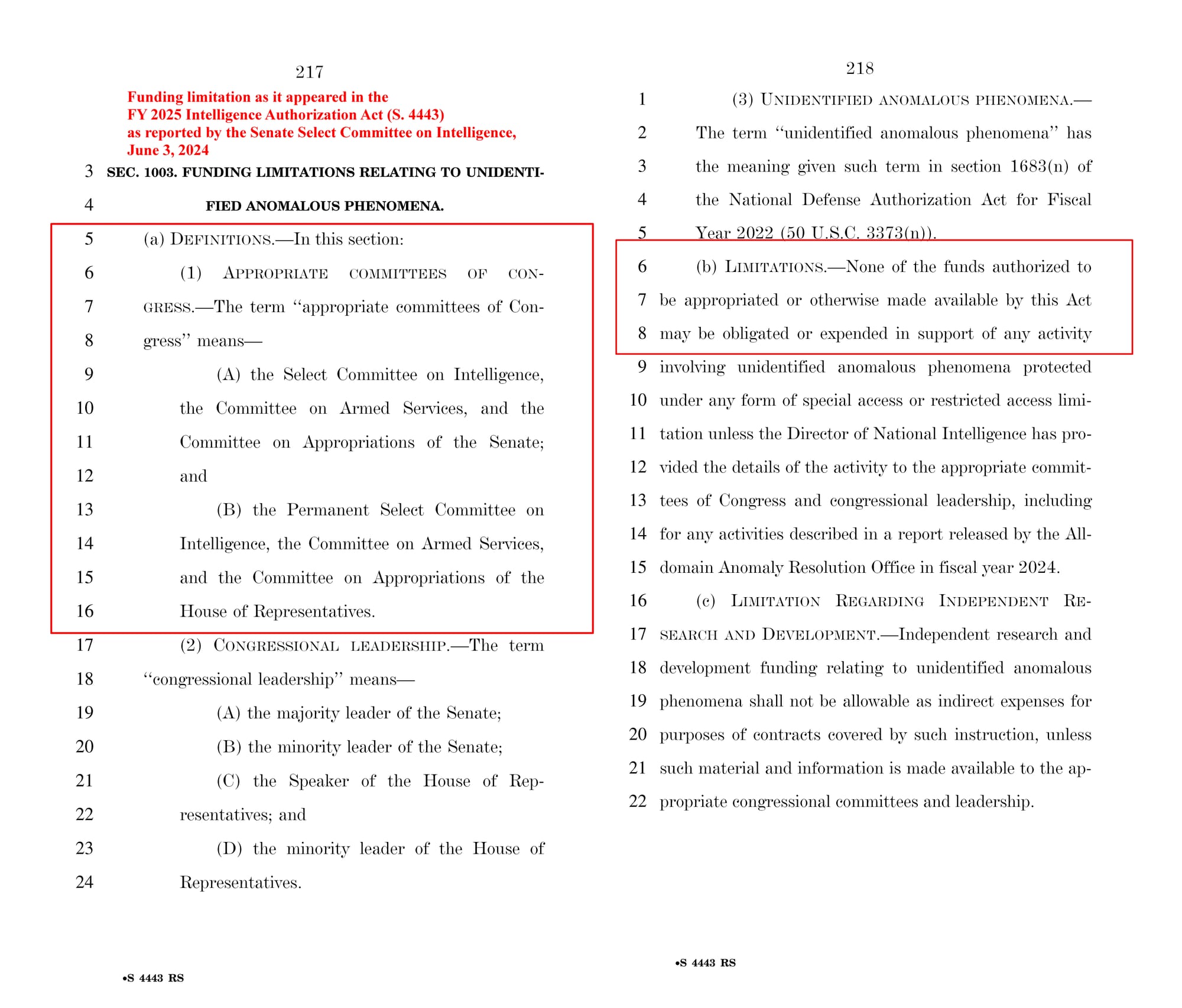
The slightly revised text of the UAP-related section, as submitted by Senator Warner within SA 2274, appears below, reproduced from page S4632 of the July 11, 2024 Congressional Record.
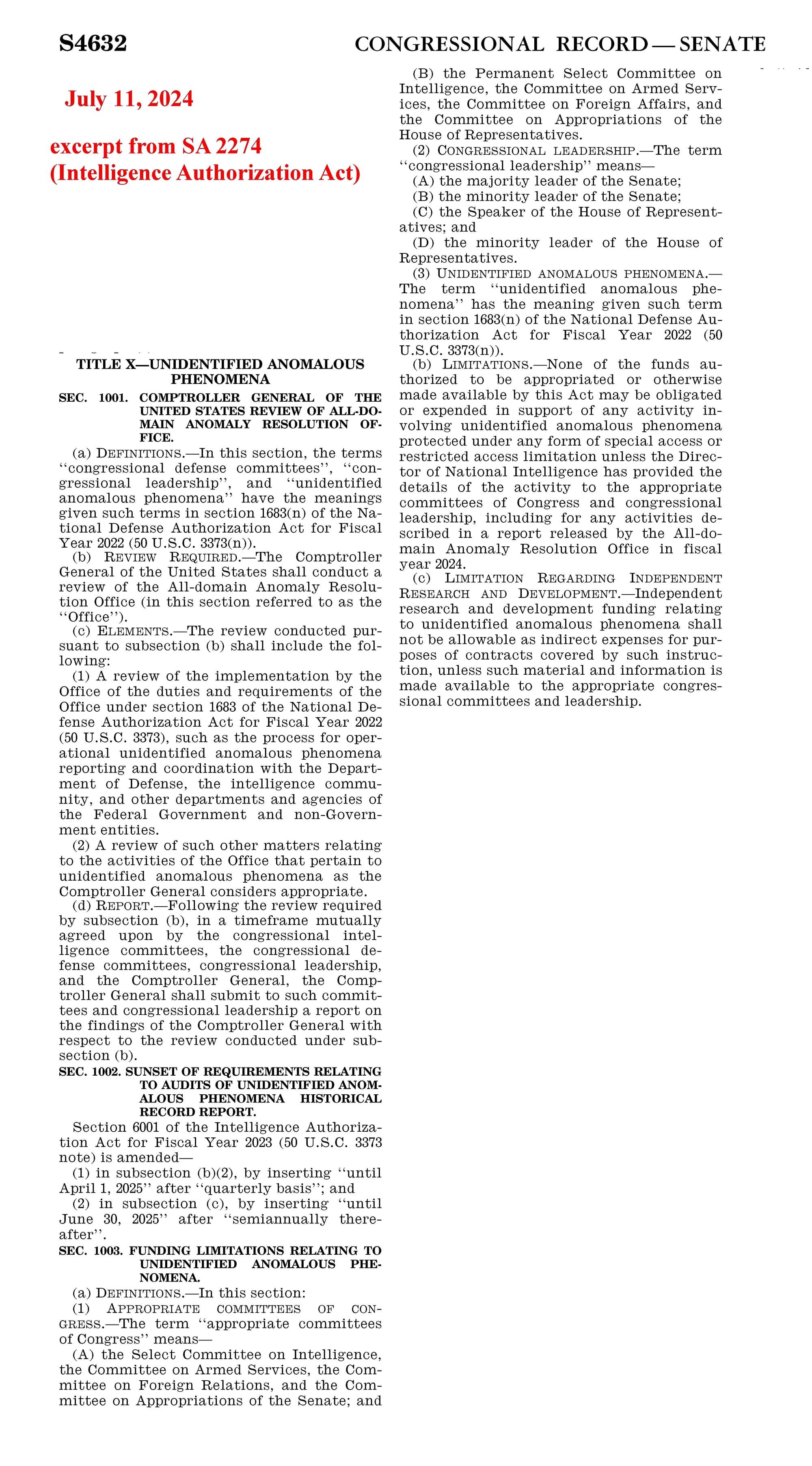
On July 31, 2024, Senator Marco Rubio (R-FL), the ranking Republican on the SSCI, on behalf of Chairman Warner and himself, filed another revised version of the FY 2025 IAA, designated as SA 3209. This version included some additional revisions to one of the UAP-related provisions, Section 1003, which is a carryover provision from the enacted FY 2024 bill, associated with Senator Kirsten Gillibrand (D-NY). It is a provision that bars funding of Intelligence Community special access programs unless they have been reported to designated congressional leaders and committees. The new version expands the list of congressional committees that must be notified. The SSCI-reported bill listed the intelligence, armed services, and appropriations committees (six committees in all). To that list have been added the House and Senate foreign affairs and homeland security committees (thus, now requiring notification of ten committees in all, in addition to the top four congressional leaders).
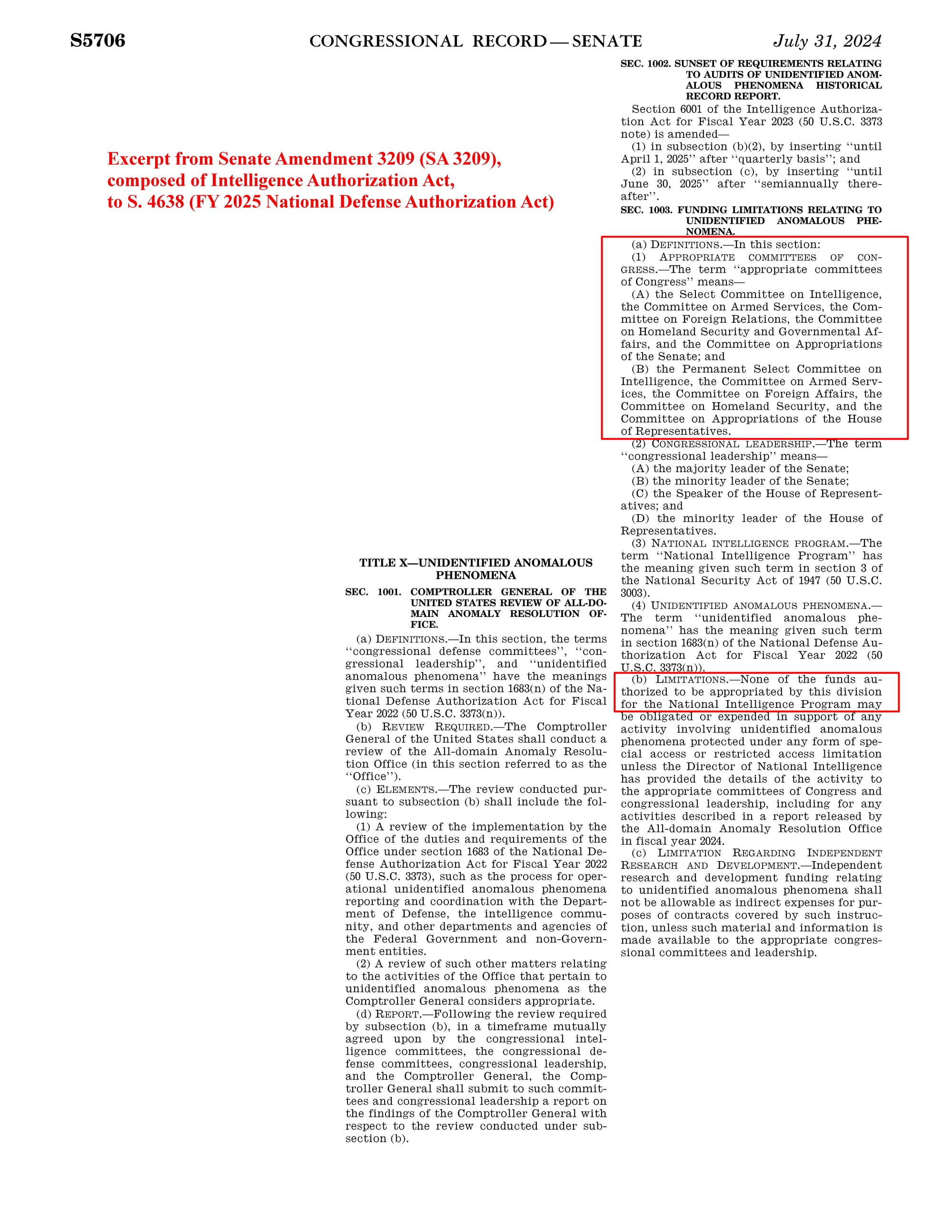
In addition, the latest revision is made specific to funding authorized within "the National Intelligence Program," which is defined in current law at 50 U.S.C. 3003) (see graphic).
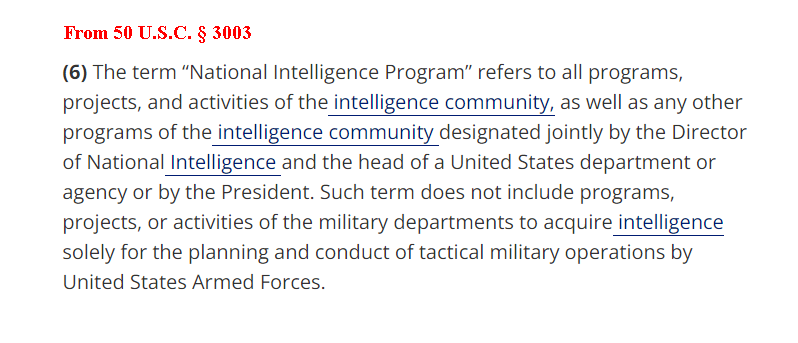
I will defer to those with more expertise to comment on any possible substantive effects of these changes. However, at first blush it seems that the changes may reflect various congressional committees asserting jurisdictional rights and engaging in lane-marking. Congressional committees traditionally are vigilant in guarding the parameters of their assigned or claimed jurisdictions.
The Fiscal Year 2025 NDAA itself (S. 4638), as reported out by the Senate Armed Services Committee on July 8, contains a separate but similar limitation (Section 1544) barring funding of unreported UAP programs within the purview of the Department of Defense. However, unlike its IAA counterpart, the FY 2025 NDAA restriction does not contain a subsection covering funding for independent research and development (IR&D). Such an IR&D subsection was part of the corresponding FY 2024 DoD funding limitation; I do not know why it is now absent from Section 1544.
The DoD funding restriction requires notification of the armed services, intelligence, and appropriations committees, and the four top congressional leaders.
I will post further updates as most information becomes available. My gmail address is my full name, Douglas Dean Johnson, with dots between the names.
SUBSTANTIVE REVISIONS SINCE THE INITIAL PUBLICATION OF THIS ARTICLE
- July 15, 2024: Added link to plain-text version of SA 2610 (Rounds-Schumer amendment to S. 4638)
- July 25, 2024: Updated to note that Senator Kirsten Gillibrand (D-NY) joined as a co-sponsor of SA 2610 on July 23, 2024.
- August 3, 2024: Updated to reflect the filing of SA 3209 (revised IAA) to S. 4638 (NDAA) on July 31, 2024, containing revised language for UAP-related provision Section 1003; the addition of Senator Martin Heinrich (D-NM) as a co-sponsor of SA 2610 (the UAP Disclosure Act) to S. 4638; and an increase in the total number of amendments filed to S. 4638.
- August 3, 2024: Updated to include quotes from, and links to, an interview with Senator Mike Rounds (R-SD) by journalist Matt Laslo, July 31, 2024.
